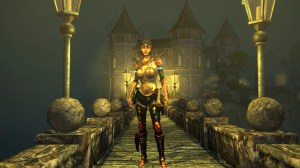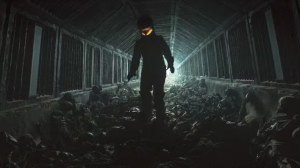Wednesday night saw Riverdale come to an end after seven seasons on The CW with the episode “Chapter One Hundred Thirty-Seven: Goodbye, Riverdale” with the episode tying a bow on one of the most original and interesting series on television. The episode — which will also get an extended version released on cwtv.com on Thursday — revealed the fates and destinies of almost all of Riverdale’s characters before closing the story and letting viewers have one last farewell to the Town With Pep. But while the series wrapped up stories and offered viewers closure after seven seasons of wild twists and crazy turns, Riverdale‘s series finale may have done something else as well and confirmed a long-held fan theory that the entire show was really just Jughead Jones’ novel and that he was telling us a tale the whole time.
Videos by ComicBook.com
Warning: spoilers for the series finale of Riverdale beyond this point.
The idea that Riverdale has all just been Jughead’s novel the entire time isn’t a new theory by any stretch. It’s one that fans came onto pretty early in the series’ run. It was initially based in the idea that when the series begins, it begins with Jughead writing a book — and we even see Jughead typing and, at times, even see Jughead seemingly observing himself with his friends — and he’s also our narrator throughout. Over the seasons, as the storylines got stranger and stranger there were certainly moments where they felt more like outright fiction. Specifically, the Gargoyle King storyline was a wild one, as was the Auteur, and frankly, everything in Season 6 all felt like stories rather than things that could actually be happening, further bolstering the idea that maybe what we were watching was Jughead working out different ideas for the novel he was working on with some things fitting, others not, and each new season or wild turn being a way to explore something else in the hope of finding the right fit. Furthering the theory was that the entire series always came to viewers from Jughead’s perspective, in a sense because as narrator, he had an omniscient presence to the point where it seemed, at times, he was directing the action more than just reporting on it.
Season 7 of Riverdale, however, really sharpened the idea that Riverdale could all just be Jughead’s work of fiction. The season premiere once again saw Jughead at his typewriter but more than that, when the characters end up in 1955, it’s Jughead and Jughead alone who remembers their “past lives” in the present. He’s also the only character that Angel Tabitha reveals the truth about Bailey’s Comet to and tasks with ensuring the new timeline they are in “bends towards justice” before making him forget — though he tries to write down everything before losing all of his memories. It’s an interesting mechanism to sort of “reset” the story overall, but it also positions Jughead to more actively be a writer and an active part of the story he’s telling in that capacity in the final season. While all of Riverdale talked about Jughead being a writer, Season 7 is the first time we’ve really seen it in action on a consistent basis as he went to work at Pep Comics. It’s through his writing for Pep and his brief friendship/mentorship with Brad Rayberry we also see Jughead’s storytelling refine itself. One could argue that Season 7 is the part of Jughead as storyteller where we see him truly polish the idea of a self-insert which ultimately allows him to structure the ending of both his fictional self and the full project he’s working on in a way that makes him something of a hero without being too overt.
The penultimate episode of Riverdale also lends to the theory that Jughead’s been writing a novel this whole time as well and that he’s been directing the story as much as he’s been experiencing. When Angel Tabitha returns, she gives him back his memories first and then drafts him as a steward of sorts for the others if they choose to regain theirs. More than that, he’s one of only two characters that elect to remember everything and, taking it one step further, he’s entrusted with information about the future. Going into the finale, it’s Jughead who ends up coming back to guide Betty through her own memories and to her end as well, suggesting that it’s Jughead who has been controlling the story the entire time.
Perhaps the most convincing piece of “evidence” if you will that Riverdale has been Jughead’s novel this entire time comes int he final moments of the series finale. It’s in his closing monologue. “We’ll leave them here, I think,” Jughead says and while it’s Angel Jughead, one soon gets the sense that it’s actually just narrator Jughead. He goes on to say that they’re forever 17, forever juniors and that he’s left them in the Sweet Hereafter before more directly addressing the viewer — reader, if you will.
If Riverdale was really just one long, wild first draft of Jughead Jones’ novel that we viewers got to “read” in the raw over seven seasons it certainly would explain some of the wild turns and seemingly the plot holes, but ultimately, that is also part of its charm. In the end what matters is that for 137 episodes, Riverdale took us on a journey. It was arguably one of the most comic book shows ever made and more than that, it genuinely marks the end of an era of television. We’re never going to see anything like Riverdale again. It’s kind of fitting that our narrator leaves us here.
“So, if you happen to see that neon sign some lonely night at the end of that long journey, the journey that every one of us is on, pull over. Come on in, take a seat. Know that you’ll always be among friends. That Riverdale will always be your home,” he says before walking away and leaving viewers with the sound of his typewriter, just like where it all began.








